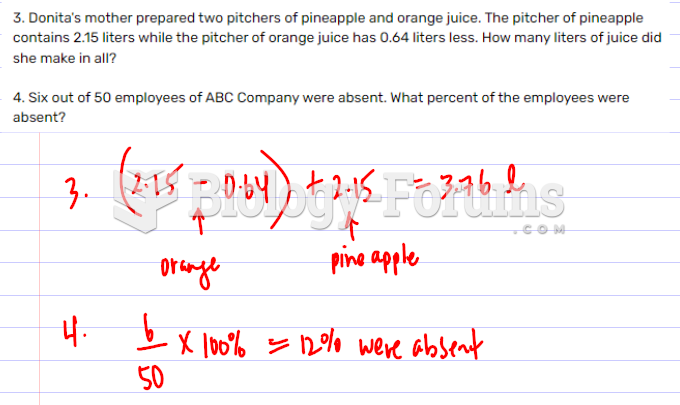|
|
|
Common abbreviations that cause medication errors include U (unit), mg (milligram), QD (every day), SC (subcutaneous), TIW (three times per week), D/C (discharge or discontinue), HS (at bedtime or "hours of sleep"), cc (cubic centimeters), and AU (each ear).
Alzheimer's disease affects only about 10% of people older than 65 years of age. Most forms of decreased mental function and dementia are caused by disuse (letting the mind get lazy).
Fatal fungal infections may be able to resist newer antifungal drugs. Globally, fungal infections are often fatal due to the lack of access to multiple antifungals, which may be required to be utilized in combination. Single antifungals may not be enough to stop a fungal infection from causing the death of a patient.
A strange skin disease referred to as Morgellons has occurred in the southern United States and in California. Symptoms include slowly healing sores, joint pain, persistent fatigue, and a sensation of things crawling through the skin. Another symptom is strange-looking, threadlike extrusions coming out of the skin.
Nitroglycerin is used to alleviate various heart-related conditions, and it is also the chief component of dynamite (but mixed in a solid clay base to stabilize it).
 The Mandarin Duck (Aix galericulata), or just Mandarin, is a medium-sized perching duck, closely rel
The Mandarin Duck (Aix galericulata), or just Mandarin, is a medium-sized perching duck, closely rel
![The mandrill (Mandrillus sphinx) is a primate of the Old World monkey (Cercopithecidae) family,[3] c](https://biology-forums.com/gallery/47/medium_12359_08_06_12_5_05_05.jpeg) The mandrill (Mandrillus sphinx) is a primate of the Old World monkey (Cercopithecidae) family,[3] c
The mandrill (Mandrillus sphinx) is a primate of the Old World monkey (Cercopithecidae) family,[3] c





